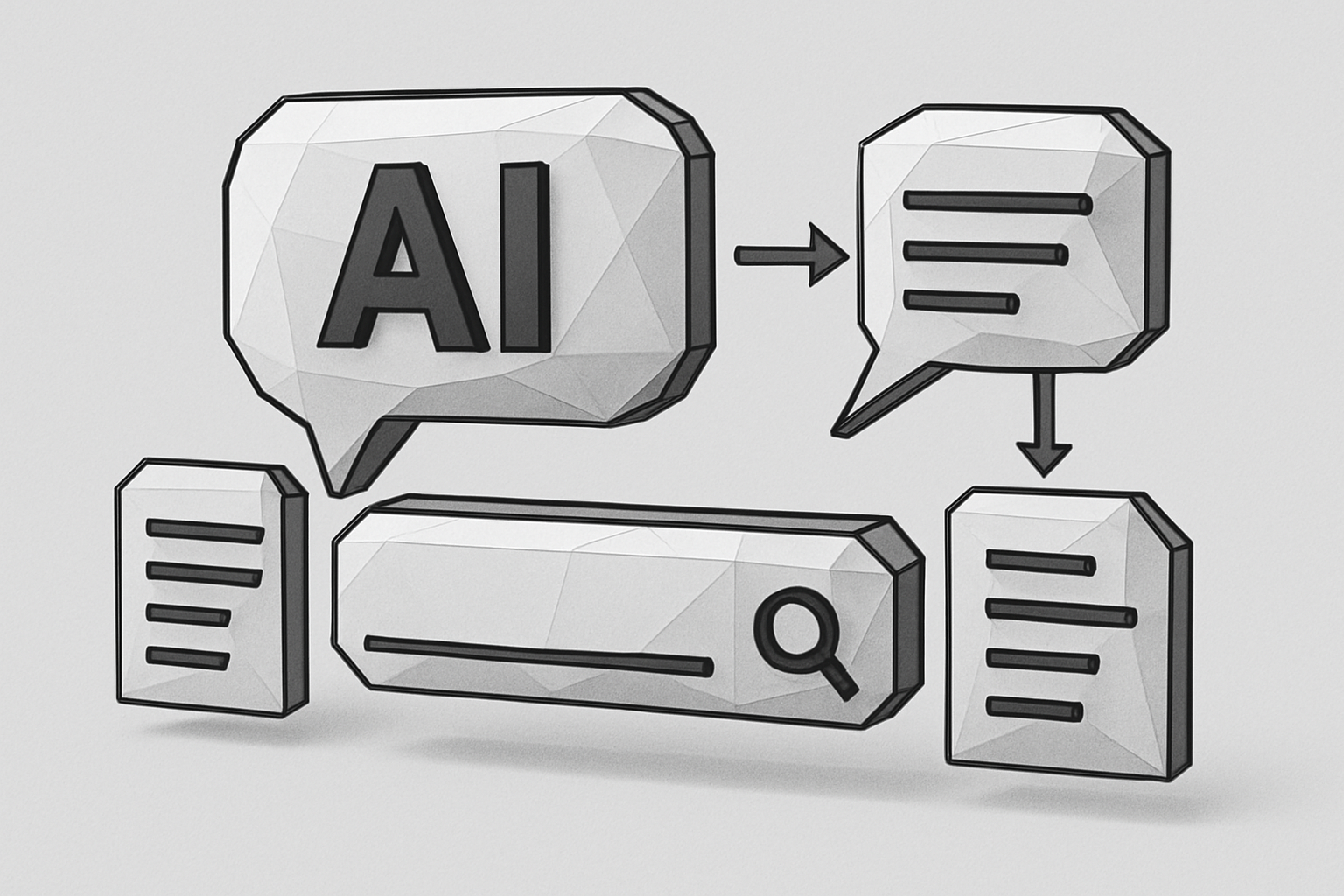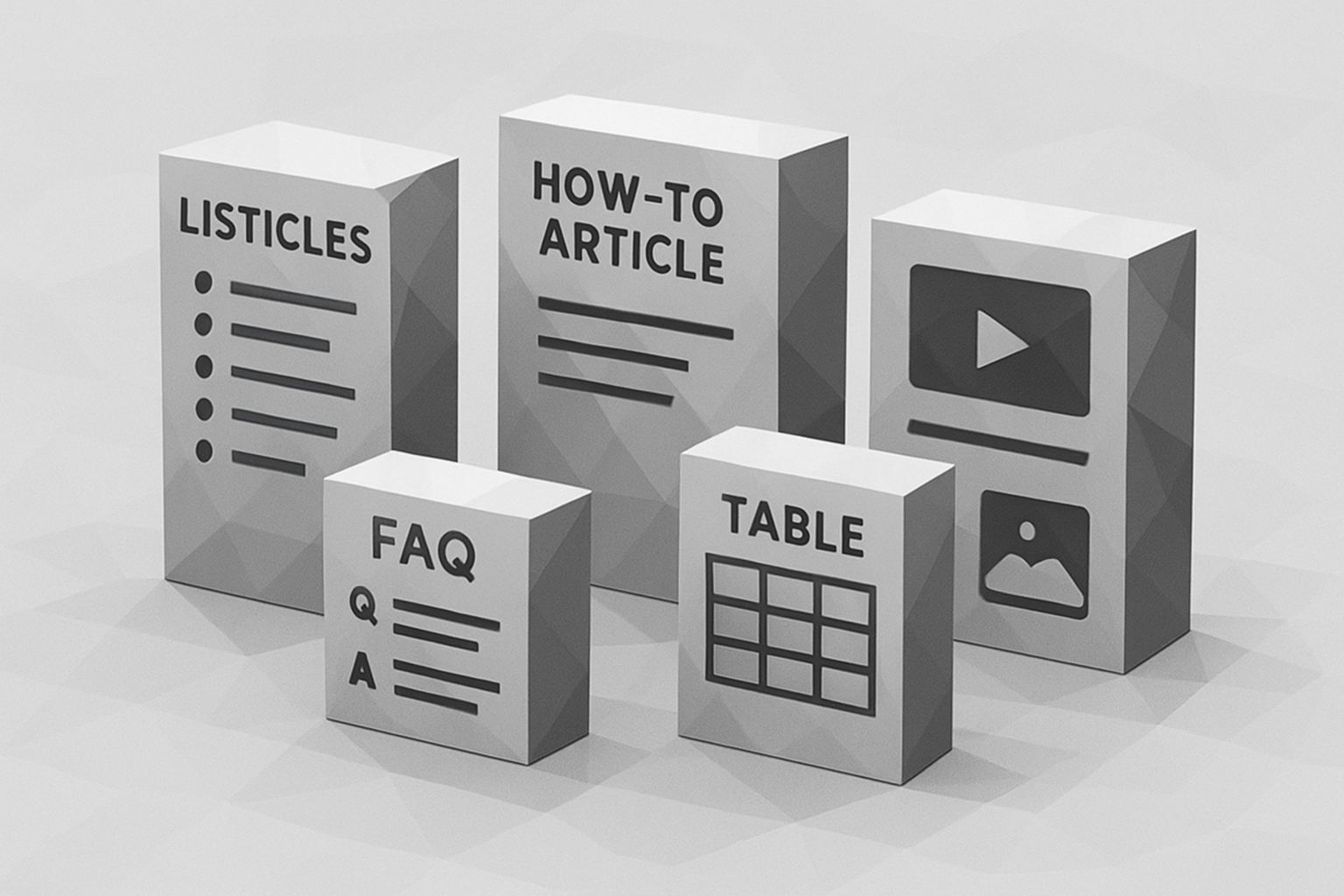Search is changing fast. AI-driven engines like ChatGPT, Perplexity, and Gemini are rewriting the rules for how people find and trust information online. The seismic shift is clear: traditional SEO tactics alone no longer guarantee your site will be seen.
For businesses and marketers, the stakes have never been higher. Adapting quickly to these new AI search realities means unlocking more engagement, higher conversions, and future-proofing your growth strategies.
This guide is your roadmap to getting ahead. You’ll learn how AI search works, how LLMs process and cite content, and get actionable seo for ai search strategies, structuring techniques, tracking methods, and expert insights for 2025.
Ready to dominate the next era of search? Let’s dive in.
The Rise of AI Search Engines: What’s Changing in 2025
The world of search is undergoing a seismic transformation as AI-powered engines like ChatGPT, Perplexity, Gemini, and Google’s AI Overviews rapidly redefine how users find information. For anyone focused on seo for ai search, understanding this revolution is now mission-critical.
AI search engines are fundamentally different from their traditional counterparts. Instead of delivering a list of blue links, they generate direct answers, summaries, and even interactive conversations. This shift is leading to more “zero-click” results—users get what they need right on the results page, often without visiting a single website.
Let’s break down what’s fueling this change:
- Conversational Queries: Users now phrase questions naturally, expecting full explanations or step-by-step guides.
- Direct Answers: AI models synthesize information from multiple sources and surface the most relevant insights instantly.
- Zero-Click Results: The need to click through to websites is reduced, especially when AI provides rich, in-line answers.
Recent data reveals just how significant this shift is. According to industry estimates, Perplexity and ChatGPT now drive over 10% of referral traffic for leading sites in specific verticals. At the same time, organic click-through rates have dropped sharply—AI Overviews and large language models are reducing organic CTR by up to 34.5%, as reported by Ahrefs.
Here’s a quick snapshot of the changes:
| Factor | Traditional Search | AI Search Engines |
|---|---|---|
| Result Format | Blue links | Direct answers, chats |
| Referral Traffic Share | 100% | Up to 10%+ from AI |
| Organic CTR | Baseline | Down 34.5% |
| Query Style | Keywords | Conversational |
| Citation Importance | Optional | Essential |
User behavior is adapting just as quickly. People are spending less time clicking through multiple results and more time engaging with in-line answers. This means that for seo for ai search, being cited as an authoritative source inside AI-generated responses is becoming the new gold standard.
Citations are now a crucial currency. Perplexity, for example, consistently attributes its sources, making it possible for sites with clear, authoritative content to win valuable visibility—even when users don’t click through. ChatGPT cites sources less often, but when it does, it favors recent, well-structured, and multimedia-rich content. Gemini and Google’s AI Overviews are also evolving, but the trend is clear: if you want to succeed with seo for ai search, you must optimize for being cited.
What does this mean for businesses and marketers? Early adopters are already seeing higher engagement and conversion rates from AI search referrals. Take Tally, for instance. This SaaS platform saw its annual recurring revenue jump from $2 million to $3 million, largely thanks to strategic optimization for AI-driven channels.
The opportunity is clear, but so is the challenge. As one recent analysis put it, AI search engines are rewriting the rules for digital visibility. Strategies that worked in the era of classic SEO are no longer enough. You need to blend traditional tactics with new approaches tailored for AI, focusing on extractable, authoritative, and up-to-date content.
To thrive in 2025 and beyond, a dual approach is essential: maintain your foundational SEO efforts while embracing the unique demands of seo for ai search. The brands that adapt first will be best positioned to capture attention, earn citations, and drive sustainable growth as AI search engines become the new default.

Core Principles of SEO for AI Search
The rules of SEO are being rewritten. As AI search engines take center stage, understanding the core principles of seo for ai search becomes crucial for staying visible online.
What’s different? AI models don’t just look for keywords—they seek meaning, context, and authoritative answers. Let’s break down the new playbook you need to thrive.

From Keywords to Concepts: How AI Understands Content
Traditional SEO focused on matching exact keywords. In contrast, seo for ai search rewards depth, clarity, and semantic richness.
AI search engines leverage large language models (LLMs) to interpret topics holistically. They parse context, intent, and relationships between ideas, not just repeated words.
To win, prioritize:
- Clear, jargon-free explanations.
- Comprehensive coverage of a topic.
- Unique perspectives or original research.
This shift means your content must answer real questions, not just tick boxes for keyword density. Aim to be the best explainer in your niche, not just the most optimized.
Structured, Extractable, and Multimedia-Rich Content
AI engines excel at extracting information from well-structured pages. For effective seo for ai search, organize your content with logical headings, bullet lists, and semantic HTML.
Use elements like:
- Tables for summarizing data.
- Images and videos for visual context.
- Definition lists for clear explanations.
Multimedia isn’t just decoration—it’s cited in 70% of general queries. Especially for non-YMYL topics, embedding relevant visuals can boost your chances of being featured in AI-generated answers.
Authority, Freshness, and the Canonical Advantage
Being the “canonical” source—the definitive answer on a subject—matters more than ever. AI search engines favor content that demonstrates authority and trust.
How do you establish this? Regular updates, evidence-backed claims, and transparent sourcing. For YMYL (Your Money or Your Life) queries, 91% of cited articles are authoritative lists or guides.
Freshness is also key. AI models often prioritize recently updated content, so schedule regular reviews and refreshes. This not only helps with traditional rankings but is vital for seo for ai search.
Data-Driven Insights: What AI Search Engines Cite
Want to know what gets cited? Here’s a quick breakdown:
| Format | % of Citations (General) | % YMYL Citations |
|---|---|---|
| Listicles | 35% | 91% |
| How-to Guides | 30% | 20% |
| Multimedia | 70% (images/videos) | 10% (images) |
AI search engines love actionable, well-organized guides. For more tactics and tools to optimize your approach, see these AI SEO strategies and tools.
Ultimately, seo for ai search is about clarity, authority, and adaptability. By focusing on these core principles, you’ll future-proof your organic growth in the AI-driven era.
Step-by-Step Strategies to Optimize for AI Search in 2025
Adapting to AI-driven search requires a fresh playbook. Below are seven actionable steps to help you maximize visibility, citations, and engagement in the evolving landscape of seo for ai search.

Step 1: Topic and Keyword Research for AI Search
Effective seo for ai search starts with knowing what users—and AI engines—are looking for. Instead of just targeting high-volume keywords, dig into forums, Reddit, X, and industry-specific communities. Identify emerging trends and unanswered questions.
Use AI tools and prompt libraries to generate natural language, long-tail, and question-based queries. Focus on intent and real-world phrasing. This approach uncovers frontier topics AI search engines love to surface.
- Track competitor gaps for unique opportunities
- Prioritize evergreen and fast-evolving subjects
- Map questions that trigger conversational AI responses
Stay agile and update your keyword research regularly.
Step 2: Crafting Definitive, Evidence-Based Content
To win at seo for ai search, your content must go beyond summaries. Be the definitive source by including original data, expert commentary, benchmarks, and unique insights. LLMs reward depth and clarity over keyword stuffing.
Support your claims with statistics, code examples, or real-world case studies. Use precise, consistent terms to help AI engines understand your expertise. The more comprehensive and self-contained your article, the higher the chance it will be cited as a source.
- Add original charts or infographics
- Quote industry leaders or practitioners
- Include actionable tips and step-by-step walkthroughs
Aim for content that answers questions and provides value at every turn.
Step 3: Structure for Machines and Humans
Structuring is critical for seo for ai search. Clean heading hierarchies (H1, H2, H3) and semantic HTML make your content easy for both users and AI to navigate. Use Schema.org/JSON-LD markup—like TechArticle or FAQPage—to signal context and extractable information.
Format content with bullet points, tables, and definition lists. Embed relevant images, charts, and videos. According to Optimizing content for AI-powered SERPs, well-structured content is more likely to be surfaced by AI-powered engines.
- Make context and intent clear in text and code
- Ensure static HTML and indexable pages for crawlability
- Use descriptive alt text for every image
This foundation maximizes your visibility in AI search results.
Step 4: Seed Authentic Citations and Mentions
Credibility is everything in seo for ai search. After publishing, distribute your content in high-signal communities like Reddit, Hacker News, X, GitHub, and LinkedIn. This not only drives traffic but also increases the likelihood of organic citations.
Build interlinked topic clusters on your site to establish authority. Engage with relevant communities, answer questions, and share open-source resources to encourage references. AI search engines often pick up on these organic signals when surfacing content.
- Comment thoughtfully in forums
- Reference your content in discussions
- Foster relationships with industry peers
Seeding authentic mentions boosts your content’s reach and authority.
Step 5: Maintain a Refresh Cadence
Freshness is a ranking factor for seo for ai search. Schedule regular content reviews at 30, 90, and 180 days. Update outdated facts, fix broken links, and archive obsolete pages. Keeping your sitemap and lastmod tags current signals activity to AI crawlers.
Here’s a sample refresh schedule:
| Review Interval | Action |
|---|---|
| 30 days | Quick fact check |
| 90 days | Update stats/examples |
| 180 days | Deep review/overhaul |
Proactive updates help your content remain relevant and favored by AI engines.
Step 6: Optimize for Multimedia and Engagement
Visuals play a huge role in seo for ai search. Embedding relevant YouTube videos, infographics, and images makes your content more engaging and extractable. AI search engines often cite articles with embedded multimedia, especially for general queries.
Short, focused articles with videos or step-by-step visual guides are frequently surfaced by platforms like Perplexity. For non-YMYL topics, prioritize visual aids to boost visibility.
- Use high-quality, descriptive images
- Embed charts or code snippets where relevant
- Add short video explainers for tricky concepts
Multimedia can set your content apart in a crowded AI-driven landscape.
Step 7: Monitor and Adapt
The final step for seo for ai search is ongoing monitoring and adaptation. Track AI referrer traffic from domains like chat.openai.com and perplexity.ai. Use analytics tools to measure visits, source citations, and mentions.
Adjust your strategies based on what’s driving results. Watch for patterns in AI-driven citations and adapt your content structure or topics accordingly. Stay alert to new AI search features and user behaviors.
- Monitor forums and social media mentions
- Analyze which articles get cited most
- Iterate your approach based on analytics
Continuous improvement keeps you ahead in the fast-changing world of AI search.
Content Formats and Features that Win in AI Search
Winning at seo for ai search in 2025 means mastering content formats that AI engines love to cite. The structure and features of your content now play a bigger role than ever, shaping whether your page is referenced in AI-generated answers or overlooked entirely.

Why Format Matters for SEO for AI Search
AI search engines extract, summarize, and cite content differently than traditional search. They favor formats that are easy to scan, answer user questions directly, and provide structured, self-contained insights. Let’s break down which content types consistently outperform.
Top Content Formats for AI Search (2025)
| Format Type | Citation Rate (General Queries) | Citation Rate (YMYL Queries) |
|---|---|---|
| Listicles | 35% | 91% |
| How-to Articles | 30% | 38% |
| Guides | 15% | 27% |
| FAQ/Q&A | 12% | 19% |
| Tables/Data | 9% | 21% |
Source: Industry studies, Perplexity data, and Ahrefs.
Listicles, Guides, and How-Tos Dominate
Listicles and step-by-step guides consistently top the charts for seo for ai search. Their clear structure allows AI engines to extract key points efficiently. How-to articles, especially those that answer specific, natural language questions, are also highly favored.
- Use numbered lists for steps, tips, or tools.
- Break complex topics into digestible guide sections.
- Add summaries or "key takeaways" boxes at the top.
YMYL (Your Money, Your Life) Topics: Authority and Evidence
For YMYL queries, authority and evidence matter most. AI engines heavily cite list-based articles from high-authority sites, with 91% of YMYL citations going to well-structured lists or evidence-backed guides. Always cite reputable sources and include references or footnotes.
- Use date-referenced titles ("Best Strategies for 2025").
- Add expert quotes, original data, and clear attribution.
- Keep content updated and fact-checked.
Embedding Multimedia: Videos and Images
Multimedia boosts extractability for seo for ai search. In general queries, 70% of cited content includes videos or images, while for YMYL, images appear in only 10% of results due to stricter quality standards. Short explainer videos, annotated screenshots, and infographics are especially effective for non-YMYL topics.
- Embed relevant YouTube videos.
- Use original images and charts to illustrate key points.
- Caption visuals with descriptive, keyword-rich text.
FAQ and Q&A: Direct Answers Win
FAQ and Q&A formats excel because they mirror how users interact with AI search engines. AI models pull direct answers from structured question-and-answer sections, increasing your chances of being cited.
- Create FAQ sections targeting high-intent queries.
- Use subheadings for each question.
- Provide concise, direct answers followed by in-depth explanations.
Tables, Code Blocks, and Data: Extractable Insights
AI search engines love structured data. Tables, code blocks, and original datasets make it easy for AI to extract and reference your insights. For technical or product-focused topics, include:
| Feature | Old SEO | SEO for AI Search |
|--------------|--------------|------------------|
| Keyword Use | Repetition | Concept Clarity |
| Format | Plain Text | Lists, Tables |
| Citations | Optional | Essential |
- Add comparison tables, benchmarks, or checklists.
- Use code blocks for technical guides or software tutorials.
Internal and External Linking: Context is King
Internal and external links enhance authority and context, both for users and AI engines. Interlink related articles to form topic clusters, and reference authoritative external sources. As highlighted in AI search optimization insights, these strategies directly increase the likelihood of being cited in AI search results.
Final Takeaway
To succeed at seo for ai search, focus on formats that are easy for both people and AI to scan, extract, and reference. Use lists, guides, multimedia, and structured data to stand out. Keep your content fresh, authoritative, and tightly linked—this is the blueprint for organic growth in the AI-driven era.
Measuring and Tracking Your AI Search Performance
Staying ahead in seo for ai search requires more than just great content. It demands a clear understanding of how your site is performing across new AI-powered discovery channels. Traditional analytics dashboards are falling short, making attribution a true challenge for marketers and SEOs in 2025.
The Attribution Challenge
AI search engines like Perplexity, ChatGPT, and Gemini are changing what it means to measure visibility. Unlike classic search, there’s no consolidated dashboard to show exactly where your seo for ai search efforts are paying off.
AI platforms often provide answers directly in the interface, leading to zero-click results. This means less visible referral data and new hurdles in tracking user journeys. Even when you do receive traffic, it can arrive from unexpected referrer domains or masked sources.
A practical approach starts with identifying unique referrers like chat.openai.com, perplexity.ai, and bard.google.com in your analytics. Keep in mind that AI engines may cite your content without sending direct traffic, so monitoring brand mentions and citations is just as important as tracking clicks.
Tools and Methods for Tracking AI Search Performance
To effectively measure seo for ai search, you’ll need to combine multiple tools and manual checks. Here’s a quick overview:
| Metric/Source | How to Track | Why It Matters |
|---|---|---|
| AI Referrer Traffic | Google Analytics, server logs | Shows direct visits from AI engines |
| Source Citations | Search AI overviews, manual queries | Indicates authority in AI answers |
| Mentions | Social listening, forums, Reddit, X | Reveals indirect visibility |
| Index Coverage | Search Console, Bing Webmaster Tools | Ensures AI bots can access content |
| Core Web Vitals | PageSpeed Insights, Lighthouse | Affects crawlability and rankings |
Set up filters in your analytics to spot traffic from AI-specific domains. Use manual searches in Perplexity and ChatGPT to see if your pages are being cited. Track keyword rankings, but also look for your content featured in AI overviews or answers.
Don’t forget community platforms. AI search engines often pull from forums, social media, and Q&A sites, so monitoring these spaces can uncover additional impact from your seo for ai search strategy.
Turning Insights Into Action
Once you’ve gathered the data, it’s time to refine your approach. If you see a spike in Perplexity referrals after updating a guide, keep that content fresh and look for similar opportunities. If citations are low, improve semantic clarity, add new data, or update your multimedia.
Regularly review and iterate. A 67% increase in referral traffic from Perplexity is possible when you optimize for AI visibility and track results closely. According to AI's role in search rankings, adapting your content and measurement tactics can directly influence your authority in AI-driven search.
Ultimately, measuring seo for ai search is an ongoing process. By combining analytics, manual checks, and community monitoring, you can stay ahead of the curve and ensure your organic growth strategies remain effective as AI search engines evolve.
Advanced Tips and Future-Proofing Your AI SEO Strategy
Adapting to the evolving world of seo for ai search requires more than just following best practices. Future-proofing your organic visibility means staying nimble, embracing new tools, and thinking beyond traditional SEO boundaries. Let’s break down the advanced strategies you need to thrive in 2025 and beyond.
Stay Ahead with Algorithm Updates
The landscape of seo for ai search is in constant flux. AI search engines update their algorithms and citation methods frequently. Prioritize regular research to anticipate these changes. Subscribe to industry newsletters, monitor AI search documentation, and participate in SEO forums.
Want to dive deeper? Explore the future trends in SEO to understand upcoming shifts and how to position your strategy for long-term success.
Embrace New AI Search Platforms
Don't put all your eggs in one basket. New AI search engines and platforms are emerging quickly, each with unique ranking factors and citation practices. Test your site’s visibility on platforms like Perplexity, Gemini, and experimental engines.
Track how your content performs in these environments. Adjust your seo for ai search approach to align with new citation models, interface changes, and user behaviors as they arise.
Harness Community and Refresh Strategies
Building authority in seo for ai search isn’t just about publishing. Leverage community-driven content, user Q&As, and forums to seed authentic citations. Engage with users on Reddit, X, and niche communities to amplify your reach.
Set a routine for reviewing, updating, and expanding your content. Refreshing articles ensures your information is current, accurate, and favored by AI engines for inclusion in answers and overviews.
Deepen Content and Experiment with Formats
AI search engines reward semantic depth and originality. Invest in comprehensive guides, data-driven insights, and unique perspectives to stand out. Avoid thin content or keyword stuffing—quality always outperforms quantity in seo for ai search.
Experiment with interactive formats, live data widgets, and multimedia storytelling. These not only improve user engagement but also increase your chances of being cited in conversational AI results.
Foster Collaboration and Remain Agile
Future-proofing seo for ai search demands close collaboration between SEO experts, content creators, and developers. Share insights on what works, and quickly adapt your playbook as new opportunities arise.
Balance legacy SEO with emerging AI strategies by integrating AI with traditional SEO. Conduct regular audits, embrace new tools, and stay flexible. Agility is your strongest asset as AI-driven search continues to evolve.
If you’re ready to put these AI SEO strategies into action and want to make your workflow effortless, you don’t have to do it all alone. With tools like RankPill, you can automate everything from keyword research and competitor analysis to publishing SEO-optimized articles that are primed for both AI and traditional search engines. Imagine effortlessly producing authoritative, multimedia-rich content that gets cited by the latest AI search platforms—without spending hours or hiring an agency. If you’re serious about boosting your organic traffic and staying ahead in 2025, let’s take the next step together.
Get Started